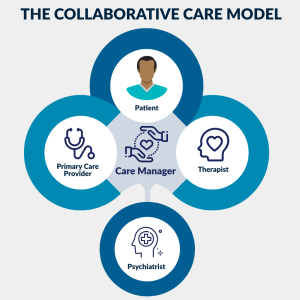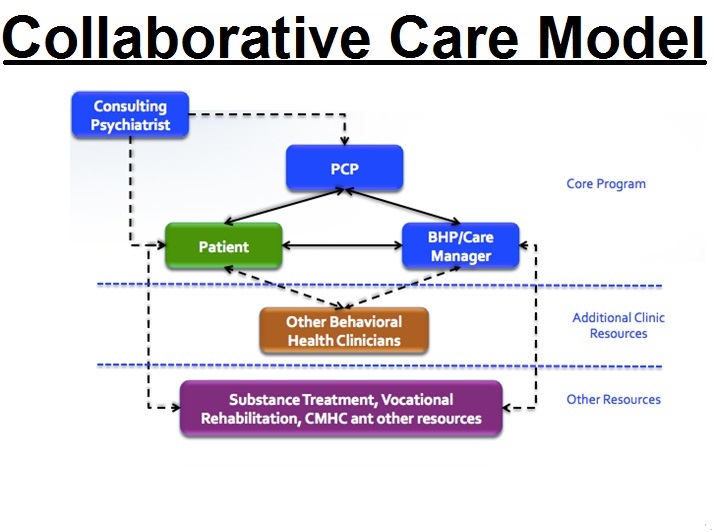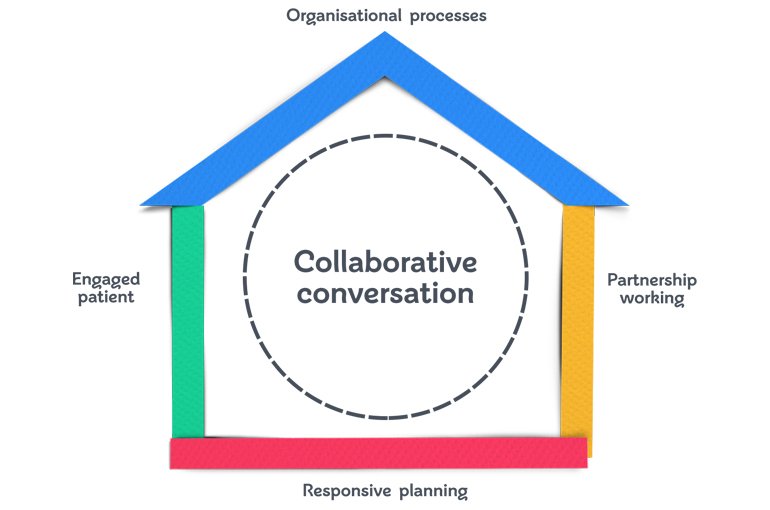The collaborative care model is a new way of delivering healthcare that is gaining in popularity. This approach involves working with a team of healthcare professionals who can provide comprehensive care for the patient. The goal is to provide coordinated and holistic care that meets the needs of the patient. In this blog post, we will discuss the benefits of the collaborative care model and how it can improve patient outcomes.
Contents
- 1 What Is Collaborative Care Model?
- 2 Working of Collaborative Care Model
- 3 Different Key Elements of Collaborative Care Model
- 4 Who Are Involved In Collaborative Care Model?
- 5 How To Get Involved In Collaborative Care Model?
- 6 How Does Collaborative Care Model Help Patients?
- 7 Examples of Collaborative Care Model
- 8 Conclusion
- 9 A Word From Therapy Mantra
What Is Collaborative Care Model?
 The collaborative care model is a team-based approach to healthcare that involves health professionals from different disciplines working together to provide coordinated, comprehensive care for their patients. The goal of this type of care is to ensure that patients receive the best possible care while also reducing costs and improving outcomes.
The collaborative care model is a team-based approach to healthcare that involves health professionals from different disciplines working together to provide coordinated, comprehensive care for their patients. The goal of this type of care is to ensure that patients receive the best possible care while also reducing costs and improving outcomes.
This model also helps providers who may not have access to specialized services like mental health care, substance use disorder treatment, or other types of specialty care. This approach allows patients to seek out these services on their own schedule. This is more convenient for them. This s rather than when someone forces you into an appointment with someone they don’t know.
Working of Collaborative Care Model

The working of collaborative care model is s follows:
The collaborative care team works together to identify patients. These are those who have benefits from this type of treatment. They may also work with other professionals in order to provide the best possible care for their patients. For example, a psychiatrist might work closely with therapists and counselors. This is so that they are able to refer appropriate patients for these services.
The team then creates a care plan according to the individual needs of each patient. This plan will include specific goals and objectives that need to be achieved in order for the patient to be considered successful.
The team meets regularly to discuss the progress of each patient and make any necessary changes to their care plan. This allows them to make sure that the patient is on track toward achieving their goals and objectives.
The team follows up with patients as needed in order to provide support and guidance when it comes time for them to leave treatment or transition back into regular life after completing therapy or counseling sessions. This helps ensure that they will continue making progress toward recovery from whatever issue brought them into treatment initially and prevents relapse from occurring down the road.
Different Key Elements of Collaborative Care Model

There are many different key elements of the collaborative care model. Some of these include:
Patient-Centered
This element of care places the patient at the center of their care. The team works together to come up with a plan that is tailored specifically to their individual needs and goals.
Coordinated Care
The goal of coordinated care is to ensure that all aspects of a patient’s care are working together towards a common goal. This includes everything from mental health services to primary care physicians.
Comprehensive Care
Comprehensive care means that patients receive all of the services they need in order to recover from their issues. This may include therapy, medication management, and other types of treatments as needed.
Team-Based Approach
The team-based approach allows for collaboration between different healthcare professionals who can provide specialized support for each individual patient. This helps improve outcomes and reduce costs.
Who Are Involved In Collaborative Care Model?

There are a number of different professionals that are involving in the collaborative care model. These include:
Mental Health Professionals
These professionals specialize in providing mental health services to patients. They can help identify patients who would benefit from this type of treatment and create a care plan that is tailored specifically to their needs.
Primary Care Physicians
PCPs are responsible for providing general medical care to their patients. They may work with mental health professionals to provide coordinated care for their patients.
Specialty Care Providers
These providers offer specialized services like substance use disorder treatment or behavioral therapy. The team-based approach allows them to collaborate with other healthcare professionals so that they can provide the best possible care for their patients.
How To Get Involved In Collaborative Care Model?
If you want to involve in the collaborative care model, there are a few ways that you can do so:
- You can contact your local mental health authority to see if they have any programs in place that use this type of care model.
- You can also reach out to your local hospital or healthcare provider to see if they offer services that utilize this approach.
- After this, you can go to the doctor and talk about your problems. If you are diagnosed with a mental illness, there is a good chance that the doctor would have already prescribed some medication.
How Does Collaborative Care Model Help Patients?

The collaborative care model helps patients in many different ways. Some of these include:
Improves Outcomes
This type of care improves outcomes for patients with mental illness. This includes things like reducing symptoms and relapse rates, as well as improving quality of life.
Reduces Costs
The team-based approach allows for collaboration between different healthcare professionals who can provide specialized support for each individual patient. This helps improve outcomes and reduce costs.
Increases Access To Care
The collaborative care model makes it easier for patients to access the services they need. This includes everything from mental health services to primary care physicians. It means that patients can get the care they need without having to travel long distances or wait for a long time.
Improves Quality Of Life
The collaborative care model improves the quality of life for patients. This includes things like reducing stress levels and improving social support. It also means that patients feel more confident about their future.
Helps To Address Stigma
The collaborative care model helps to address the stigma which often associates with mental illness. This type of care allows patients to receive treatment in a safe and supportive environment. It also helps to break down the barriers between healthcare professionals and patients.
Examples of Collaborative Care Model
There are many examples of collaborative care models. Some of these include:
Collaborative Care Model for Depression in Primary Care
This is a program that uses the collaborative care model to treat patients with depression. It was developed by researchers. These are very effective in reducing symptoms and improving quality of life.
AlaMesa Program
This is an example of a program that uses the collaborative care model to treat patients with substance use disorders. It was developed by researchers. These are effective in reducing relapse rates and improving outcomes.
Community-Based Behavioral Health Programs
These are programs that use the team-based approach to provide mental health services to patients in their community. They are often run by local mental health authorities. These are very effective in reducing symptoms and improving quality of life.
Conclusion
The collaborative care model is a better way to deliver healthcare. It is a team-based approach that allows for collaboration between different healthcare professionals. This type of care is very effective in reducing symptoms and improving outcomes. If you are interested in getting involved, there is a good chance that there is one near you.
You can also contact us for more information on this topic. We provide excellent care in this model too.
A Word From Therapy Mantra
Your mental health — your psychological, emotional, and social well-being — has an impact on every aspect of your life. Positive mental health essentially allows you to effectively deal with life’s everyday challenges.
At Mantra Care, we have a team of therapists who provide affordable online therapy to assist you with issues such as depression, anxiety, stress, relationship, OCD, LGBTQ, and PTSD. You can take our mental health test. You can also book a free therapy or download our free Android or iOS app.


